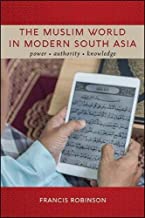The Muslim World in Modern South Asia: Power, Authority, Knowledge consists of a dozen articles (including an introduction) along with a roughly equal number of book reviews written by one of the leading historians of South Asian Muslims during the modern period. Like two earlier volumes of Francis Robinson’s collected articles and reviews, this welcome volume brings together previously published but widely scattered writings that might well be missed by many readers. Full disclosure: one of the articles was first delivered as a keynote address on the occasion of my retirement. And I confess to coming to this volume with the happy anticipation of someone who has valued Francis Robinson’s work in our shared field over many decades.
These are contributions by a consummate professional, grounded in his own research and enriched by extensive reading and synthetic analysis of Muslim societies generally.
The book reviews, many published in the Times Literary Supplement, are evidence of that breadth. Deftly, even elegantly written, they unfailingly reflect an appreciation of the historical and scholarly context each study represents. The reviews mostly deal with works focused on the pre-modern period, but they emphatically belong here as part of Indian cultural life well into the modern period. Several are of translations: of a Persian romance of the 11th century; of Sa`di’s Gulistan, long a staple of elite education in India; of the early 16th century Hindavi Sufi romance from Jaunpur, the Mirigawati; of a new edition of Annette Beveridge’s translation of the important document of Mughal India, the Babur Nama; and, finally, of a new edition of the 19th century Urdu version of the great staple of oral story-telling across vast geographies, The Tale of Amir Hamza, now transitioned to print and thus, itself, a document to 19th century history. Two of the works are biographies of Mughal emperors, of Babur, the founder, and of Shah Jahan, remembered above all for his architectural wonders.

